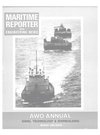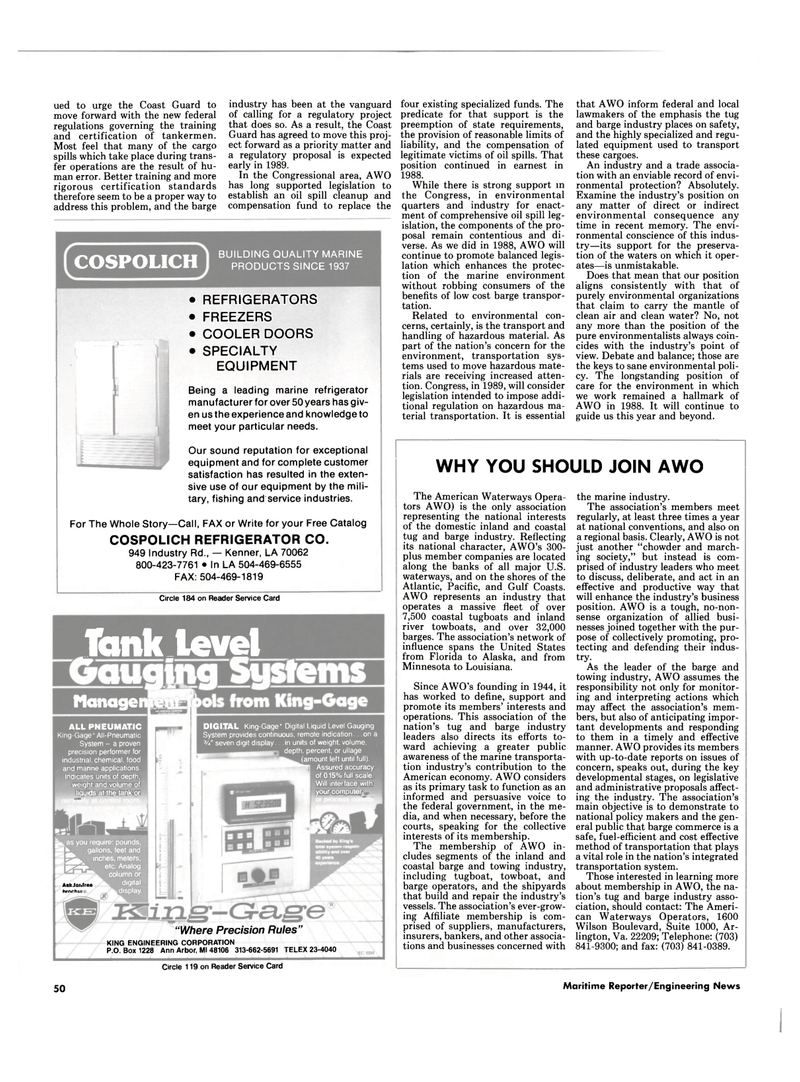
Page 50: of Maritime Reporter Magazine (March 1989)
Read this page in Pdf, Flash or Html5 edition of March 1989 Maritime Reporter Magazine
ued to urge the Coast Guard to move forward with the new federal regulations governing the training and certification of tankermen.
Most feel that many of the cargo spills which take place during trans- fer operations are the result of hu- man error. Better training and more rigorous certification standards therefore seem to be a proper way to address this problem, and the barge industry has been at the vanguard of calling for a regulatory project that does so. As a result, the Coast
Guard has agreed to move this proj- ect forward as a priority matter and a regulatory proposal is expected early in 1989.
In the Congressional area, AWO has long supported legislation to establish an oil spill cleanup and compensation fund to replace the
COSPOLICH BUILDING QUALITY MARINE PRODUCTS SINCE 1937 • REFRIGERATORS • FREEZERS • COOLER DOORS • SPECIALTY
EQUIPMENT
Being a leading marine refrigerator manufacturer for over 50 years has giv- en us the experience and knowledge to meet your particular needs.
Our sound reputation for exceptional equipment and for complete customer satisfaction has resulted in the exten- sive use of our equipment by the mili- tary, fishing and service industries.
For The Whole Story—Call, FAX or Write for your Free Catalog
COSPOLICH REFRIGERATOR CO. 949 Industry Rd., — Kenner, LA 70062 800-423-7761 • In LA 504-469-6555
FAX: 504-469-1819
Circle 184 on Reader Service Card
Tank level
Manage
ALL PNEUMATIC
King-Gage" All-Pneumatic
System - a proven precision performer for industrial, chemical, food and marine applications.
Indicates units of depth, weight and volume of .,:|Bjids at the tank or as you require: pounds, k gallons, feet and
W^^ inches, meters, j^Sjk etc. Analog column or digital display. Ask for free hrnrhui
DIGITAL King-Gage' Digital Liquid Level Gauging
System provides continuous, remote indication.. on a %" seven digit display . .in units of weight, volume. depth, percent, or ullage (amount left until full).
Assured accuracy of 0.15% full scale.
Will interface with your compute^. w s "Where Precision Rules''
KING ENGINEERING CORPORATION
P.O. Box 1228 Ann Arbor, Ml 48106 313-662-5691 TELEX 23-4040
Circle 119 on Reader Service Card four existing specialized funds. The predicate for that support is the preemption of state requirements, the provision of reasonable limits of liability, and the compensation of legitimate victims of oil spills. That position continued in earnest in 1988.
While there is strong support in the Congress, in environmental quarters and industry for enact- ment of comprehensive oil spill leg- islation, the components of the pro- posal remain contentious and di- verse. As we did in 1988, AWO will continue to promote balanced legis- lation which enhances the protec- tion of the marine environment without robbing consumers of the benefits of low cost barge transpor- tation.
Related to environmental con- cerns, certainly, is the transport and handling of hazardous material. As part of the nation's concern for the environment, transportation sys- tems used to move hazardous mate- rials are receiving increased atten- tion. Congress, in 1989, will consider legislation intended to impose addi- tional regulation on hazardous ma- terial transportation. It is essential that AWO inform federal and local lawmakers of the emphasis the tug and barge industry places on safety, and the highly specialized and regu- lated equipment used to transport these cargoes.
An industry and a trade associa- tion with an enviable record of envi- ronmental protection? Absolutely.
Examine the industry's position on any matter of direct or indirect environmental consequence any time in recent memory. The envi- ronmental conscience of this indus- try—its support for the preserva- tion of the waters on which it oper- ates—is unmistakable.
Does that mean that our position aligns consistently with that of purely environmental organizations that claim to carry the mantle of clean air and clean water? No, not any more than the position of the pure environmentalists always coin- cides with the industry's point of view. Debate and balance; those are the keys to sane environmental poli- cy. The longstanding position of care for the environment in which we work remained a hallmark of
AWO in 1988. It will continue to guide us this year and beyond.
WHY YOU SHOULD JOIN AWO
The American Waterways Opera- tors AWO) is the only association representing the national interests of the domestic inland and coastal tug and barge industry. Reflecting its national character, AWO's 300- plus member companies are located along the banks of all major U.S. waterways, and on the shores of the
Atlantic, Pacific, and Gulf Coasts.
AWO represents an industry that operates a massive fleet of over 7,500 coastal tugboats and inland river towboats, and over 32,000 barges. The association's network of influence spans the United States from Florida to Alaska, and from
Minnesota to Louisiana.
Since AWO's founding in 1944, it has worked to define, support and promote its members' interests and operations. This association of the nation's tug and barge industry leaders also directs its efforts to- ward achieving a greater public awareness of the marine transporta- tion industry's contribution to the
American economy. AWO considers as its primary task to function as an informed and persuasive voice to the federal government, in the me- dia, and when necessary, before the courts, speaking for the collective interests of its membership.
The membership of AWO in- cludes segments of the inland and coastal barge and towing industry, including tugboat, towboat, and barge operators, and the shipyards that build and repair the industry's vessels. The association's ever-grow- ing Affiliate membership is com- prised of suppliers, manufacturers, insurers, bankers, and other associa- tions and businesses concerned with the marine industry.
The association's members meet regularly, at least three times a year at national conventions, and also on a regional basis. Clearly, AWO is not just another "chowder and march- ing society," but instead is com- prised of industry leaders who meet to discuss, deliberate, and act in an effective and productive way that will enhance the industry's business position. AWO is a tough, no-non- sense organization of allied busi- nesses joined together with the pur- pose of collectively promoting, pro- tecting and defending their indus- try.
As the leader of the barge and towing industry, AWO assumes the responsibility not only for monitor- ing and interpreting actions which may affect the association's mem- bers, but also of anticipating impor- tant developments and responding to them in a timely and effective manner. AWO provides its members with up-to-date reports on issues of concern, speaks out, during the key developmental stages, on legislative and administrative proposals affect- ing the industry. The association's main objective is to demonstrate to national policy makers and the gen- eral public that barge commerce is a safe, fuel-efficient and cost effective method of transportation that plays a vital role in the nation's integrated transportation system.
Those interested in learning more about membership in AWO, the na- tion's tug and barge industry asso- ciation, should contact: The Ameri- can Waterways Operators, 1600
Wilson Boulevard, Suite 1000, Ar- lington, Va. 22209; Telephone: (703) 841-9300; and fax: (703) 841-0389. 50 Maritime Reporter/Engineering News

 49
49

 51
51
